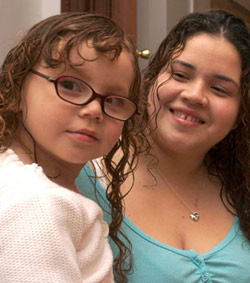(Adapted from Child Welfare Watch Vol. 16)
Correction: This article originally stated incorrectly that in order to participate in the Nurse-Family Partnership, teens must sign up by their third month of pregnancy. In fact, any low-income, first-time mother-to-be living in one of the Nurse-Family Partnership's service areas can sign sign up for the program as long as she is no more than 28 weeks pregnant. The partnership also has an initiative that targets teens in foster care, where a nurse travels to meet the mothers wherever they reside. The article below has now been corrected.

Just before Mayra Pacheco gave birth at age 16, she moved in with a foster mother who owned a brownstone in Bedford-Stuyvesant, Brooklyn. Pacheco had two rooms, a bathroom and even a tiny kitchen for herself, her brother and her soon-to-arrive baby.
READ MORE:
Teens present particular challenges for foster parents. What are city agencies and private organizations to help old youngsters in the foster care system stay with families and out of institutions?
Giving Foster Teens a Place to Call Home
What she didn't have was much guidance. Arriving home from the hospital with her newborn daughter, Pacheco was terrified. "It was crazy," Pacheco, now 21, recalls. "It was very scary. I was so young. And I don't have any family members here."
Pacheco found prenatal care for herself at a nearby hospital and took a birthing class there with her boyfriend. But she says her agency never referred her to parenting classes. Her foster mother wasn't around much and did not offer any advice on how to care for a newborn.
As a group, teen mothers face many of the same daunting odds as teenagers in foster care (see related story). Both groups are more likely than their peers to live in poverty and drop out of high school. Yet in New York City, the foster care system has largely overlooked pregnant and parenting teens. The city's Administration for Children's Services does not provide the privately run foster care agencies it oversees with guidelines on services for pregnant and parenting teens. Nor does it keep track of how many teens in the system are pregnant or parenting.
A 2005 survey by the public advocate's office estimated there to be 437 pregnant and parenting teens in the system. But there are only about 42 beds for pregnant teens in the city's maternity shelters and 157 beds for teen moms in residences for mothers and their children. This means most pregnant and parenting teens in foster care live in foster homes.
Yet there are no citywide standards for how foster parents should be trained to help young mothers, and ACS does not measure whether pregnant teens receive prenatal care and instruction in parenting skills. The agency does conduct periodic random reviews to determine whether foster children-pregnant or not-are receiving appropriate medical care. ACS also encourages agencies to refer pregnant teens to the Nurse-Family Partnership, which provides intensive in-home support to new moms for two years.
For teens in foster homes, supervision and assistance generally falls to the foster parents, who must negotiate caring for a teen who is in the foster care system and a baby who is not. "Some foster parents take over and try to parent the baby themselves," said Miranda Seaton, a caseworker at Good Shepherd Services. This can prevent the teen from stepping into the parenting role, she says.
In 1968, Inwood House created the city's only foster home program for young mothers. The agency recruits foster parents to work with teen mothers and has tailored the foster parent training program to include topics like talking to teens about contraception and how to allow your teen to be a teen while teaching them to be a parent. The agency also holds offers a support group for foster parents and provides them with lots of attention, says Norma Uriguen, director of teen family support services.
At 17, Melissa Cueves had a new baby who'd been born with disabilities and was living in a kinship foster home with her aunt, who had four other kids. "I needed all the help I could get," she recalled. Cueves and her aunt went to Inwood House's program. There, Cueves took classes on budgeting, domestic violence and parenting skills. Her social worker accompanied her on doctor's visits and taught her how evaluate daycare centers. And Cueves met a group of peers, some of whom she's still in touch with six years later.
"Everyone was dealing with the same issues as me," she said.
Child Welfare Watch is a joint project of the Center for New York City Affairs at The New School and the Center for an Urban Future. Edited by Andrew White.
Â




